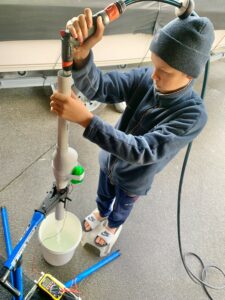
Conservation was a key theme among entries this year with an innovative humane trap for wallabies securing first place, and an energy saving solution, ‘Down the Drain’ as runner-up.
An outstanding year of Samsung Solve for Tomorrow entries has seen conservation high on the agenda for many Kiwi kids, with more than 50 per cent of entries dedicated to conservation and managing climate events.
Two east Auckland intermediate school students picked up awards too but the win went to year nine Rotorua student Cameron Moore who developed the most outstanding entry on this theme and for the competition; and has been crowned the 2023 winner of Samsung Solve for Tomorrow for his invention, ‘Humane Trap for Wallabies’.
Samsung Solve for Tomorrow is a nationwide competition delivered in partnership with Motat [Museum of Transport and Technology] and Tenz [Technology Education New Zealand], challenging the next generation of Kiwi innovators to harness the power of Steam (science, technology, English, the arts and maths) to create meaningful change within their communities.
However, it’s not just native forest conservation that Kiwi kids are tackling.
Year 8 student Thomas Costar from Somerville Intermediate School was awarded second place, designing a revolutionary drainage system that could be built into homes across the country to prevent energy loss.
“What impressed me the most about Thomas’ project, was the scientific approach he took to development, and his demonstration of the design-thinking process.
“His experimentation and rigorous testing resulted in a much more applicable design than his first attempt,” says Dr Joel Rindelaub.
“This perseverance is a skill that will be critical throughout his career, whichever path he decides to pursue.”
The judges were so impressed with this year’s entries that they also awarded two students with highly commended prizes; year 7 Howick Intermediate School student Archie Gilchrist whose project aims to protect Kiwis from predators and year 10 student Sarah Perera who created a completely sustainable pen that biodegrades naturally.
Thomas Costar says he was “really surprised” with the second placing.
“I thought they were calling me to follow up with some information for the judges and when they told me I’d won second place I was speechless, ” he says.
“My science teacher Mr [Stuart] Read is great. At Somerville Intermediate there is a lot of support for the Science Fair and a lot of students do well at the awards. My innovation was a part of the NIWA science fair.
“After the fair Mr Read heard about the Solve for Tomorrow competition and told me, ‘You should submit your project for this, you have nothing to lose.’ There was some more work required as I wanted to make a video presentation but he was right, and it was worth it.
“Water is a limited resource. At the very beginning, the idea was just to make one appliance that uses water in a house carbon-neutral, or even better, generate a surplus of energy. It could be the toilet or the shower or a sink.
“All these things had a lot of obstacles that were hard for me to overcome, so I decided on a downpipe. I knew I wanted to make a turbine and I learned a lot about the different types of turbines in the process.”
Archie Gilchrist was also surprised.
“It was exciting and a little bit nervous to go to Motat to receive my award and meet some of the judges like Siouxsie Wiles and Joel Rindelaub,” he says.
“It was an honour to be one of only four winners in the whole of New Zealand. I feel really proud of this achievement.
“Howick Intermediate has lots of great opportunities that allows kids to try out lots of different things, things they have never done or thought about doing before, and this project was something totally new for me.
“My Innovative learning teacher Mrs [Karen] Woolridge was very enthusiastic and encouraged me in the planning and was supportive all the way through.”
“The idea started when I visited Scotland in April and I was annoyed every time I passed sonar pest deterrents in people’s front gardens, and the idea evolved back in New Zealand once I had done some research on how something similar could be used to help Kiwis against predators.”
The first and second place winners shared a prize pool of $20,000 in cash and Samsung tech for them and their schools, with the highly commended entries also winning Samsung tech.
Each winner was recognised at an awards ceremony on October 5.










